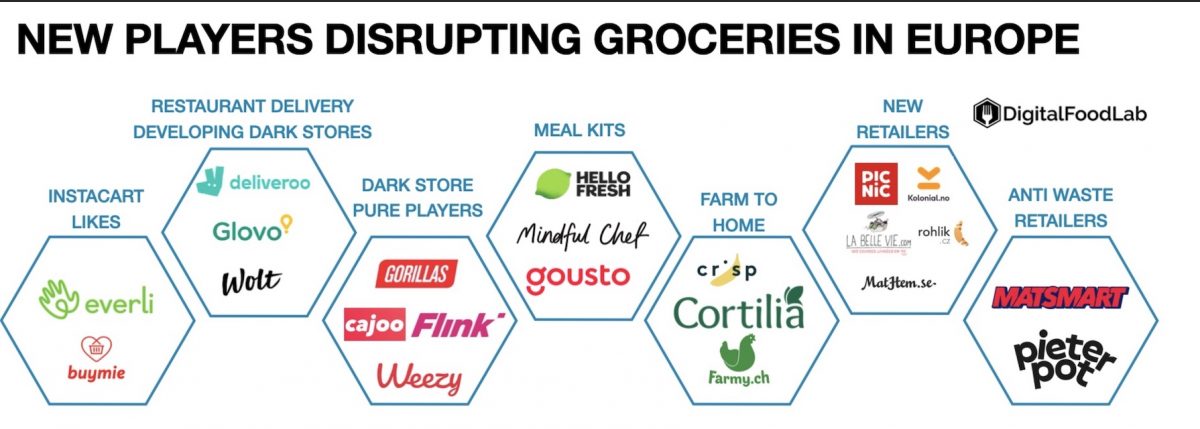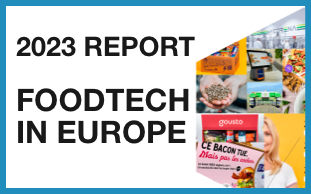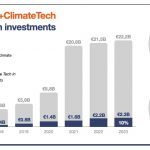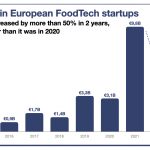One of the positive aspects of COVID (from a FoodTech point of view, at least) is how fast e-commerce has grown and become ubiquitous. This is creating a lot of new opportunities. In the past weeks alone, many grocery delivery startups have announced deals. This may become the key foodtech theme of 2021 as investors and entrepreneurs are betting that they can disrupt food retail. I really feel that the amounts invested and the general interest in the subject are reminiscent of the growth of the restaurant delivery ecosystem of five or six years ago. However, grocery business is much bigger and the assailants are coming with a broader array of strategies. Indeed, we have identified seven types of player and business model:
1- 🍽️ ⇒ 🏠 Restaurant delivery startups, such as Deliveroo and Wolt, which are now partnering with retailers to deliver groceries. Glovo recently raised a new round of $100M to grow in that space and open its own dark stores.
2- 🏪 🚴♂️ Dark store pure players, such as Gorillas or Weezy, which operate their own facilities and assortments (and hence potential partnerships with CPG brands). These startups’ promise is to deliver convenience orders (such as shampoo, or more believably, a bottle of wine) in less than 15 minutes. In the past month:
- Dija, which raised $20M last year, is now launching in London
- Getir, a Turkish player, raised $128M to grow internationally, notably in London and Paris
- Flink, a German startup, raised $52M to compete with Gorillas (which also raised $44M)
- Cajoo, a French startup, raised €6.6M and launched in multiple locations in Paris
⇒ That’s a lot of money! For city dwellers like me, it will be a boon: we’ll have a couple years of subsidized deliveries and almost free food. As the competition intensifies we will see the return of the coupons which made food almost free during the height of the competition between Deliveroo, Uber and others. For their investors, I am not so sure.
3- 🆕 New retailers: startups which raised the biggest amounts of money to build, from scratch, the infrastructure of e-commerce grocers on the national level:
- Rohilk, a Czech startup, already active in two other countries, Austria and Hungary, raised $230M to expand in new markets.
- Picnic, the famous Dutch startup, which has raised €350M until now, is already active in Germany’s bordering cities and should reach France soon.
More here on these two startups

4- 🥑🥕 ⇒ 📦 Meal kits (ingredients coupled with recipes): 2020 was the year of the come-back for these ventures as consumers became wary of supermarkets. Gousto became a unicorn and Mindful Chef was acquired by Nestlé. We’ll have to see if this positive trend persists as the pandemic eases and other models grow.
5- 👨🏻🌾 ⇒ 🏡 Farm-to-home startups have a very compelling promise for the consumer: you will receive fresh food delivered from farms and producers as close as possible to your home. The underlying idea relies on impeccable logistics in which most items spend less than a day in warehouses. Three startups lead that trend in Europe:
- Cortilia which raised €34M in January
- Farmy which revealed its impressive revenue growth
- Crisp which just raised €30M
6- 🏪 Instacart-likes. Instacart’s concept (basically Uber for groceries; you do your shopping on Instacart’s app and independent workers will go collect them for you) has inspired many startups globally, such as BuyMie in Europe. On the surface, this model is much leaner than others as it doesn’t require warehouses or means of transportation (nor even actual workers). However, Instacart’s growth seems to require a constant influx of cash. With more than $2B raised, it has just added $265M to its pockets before a planned IPO.
7- 🗑️ Anti-waste retailers
A small but growing ecosystem of startups is fighting against food waste. Some, such as Matsmart (Sweden), market surplus foods. Others, such as L’Intendance (France), sell unpackaged foods in reusable pots. These startups have been attracting more attention with recent deals:
⇒ The grocery market is big enough for all these business models to survive. However, all won’t be able to deliver on the promise they made to their investors. When I look at this market, I have three questions:
1 – Could this solution potentially be affordable to the bulk of consumers? Indeed, the number of consumers for whom convenience and quality are higher priorities than the price of the foods they buy is limited.
2 – Is there any economy of scale? Is adding a new city to your belt reducing the costs?
3 – What is the end game? Is there someone to acquire these startups or are they surfing on a long-term trend big enough to disrupt the market?
This is definitely an ecosystem that we will keep looking at as new deals and launches are made in the coming months and years. Retailers and CPG companies should also start to question how they will answer the challenges created by these new heavily funded ventures. Fortunately for them, they can call DigitalFoodLab if they want to talk about it 😉 (by the way, you can contact me here)







